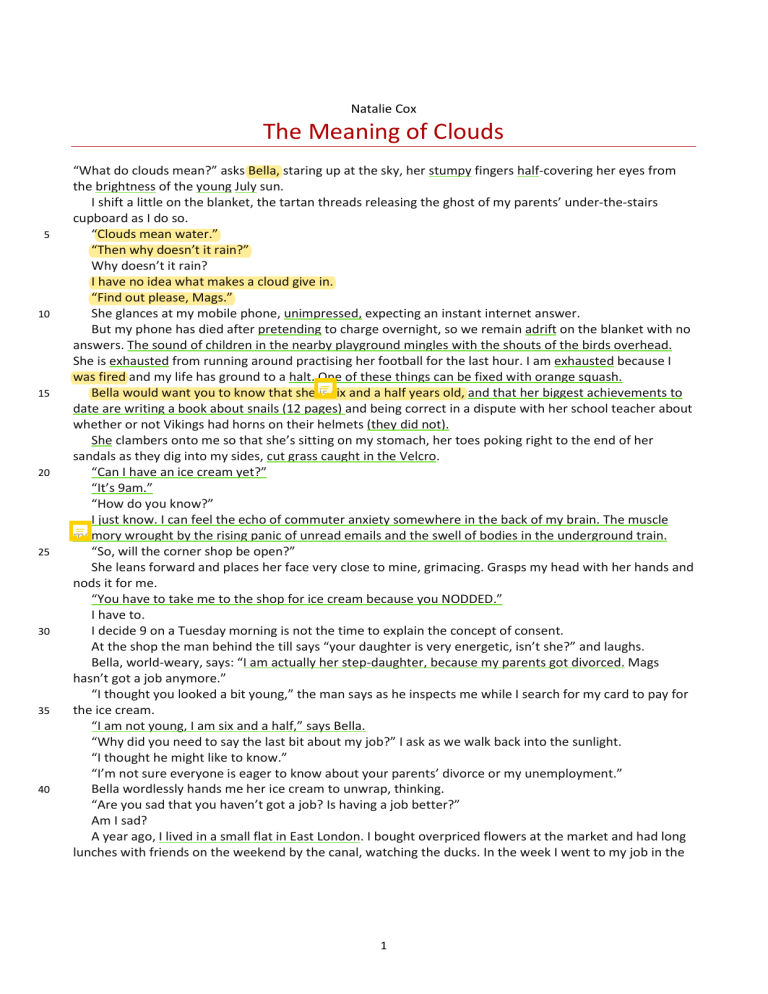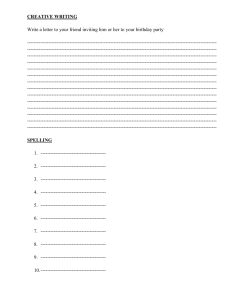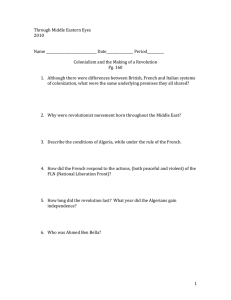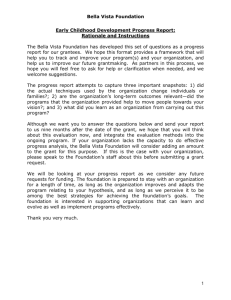
Natalie Cox The Meaning of Clouds 5 10 15 20 25 30 35 40 “What do clouds mean?” asks Bella, staring up at the sky, her stumpy fingers half-covering her eyes from the brightness of the young July sun. I shift a little on the blanket, the tartan threads releasing the ghost of my parents’ under-the-stairs cupboard as I do so. “Clouds mean water.” “Then why doesn’t it rain?” Why doesn’t it rain? I have no idea what makes a cloud give in. “Find out please, Mags.” She glances at my mobile phone, unimpressed, expecting an instant internet answer. But my phone has died after pretending to charge overnight, so we remain adrift on the blanket with no answers. The sound of children in the nearby playground mingles with the shouts of the birds overhead. She is exhausted from running around practising her football for the last hour. I am exhausted because I was fired and my life has ground to a halt. One of these things can be fixed with orange squash. Bella would want you to know that she is six and a half years old, and that her biggest achievements to date are writing a book about snails (12 pages) and being correct in a dispute with her school teacher about whether or not Vikings had horns on their helmets (they did not). She clambers onto me so that she’s sitting on my stomach, her toes poking right to the end of her sandals as they dig into my sides, cut grass caught in the Velcro. “Can I have an ice cream yet?” “It’s 9am.” “How do you know?” I just know. I can feel the echo of commuter anxiety somewhere in the back of my brain. The muscle memory wrought by the rising panic of unread emails and the swell of bodies in the underground train. “So, will the corner shop be open?” She leans forward and places her face very close to mine, grimacing. Grasps my head with her hands and nods it for me. “You have to take me to the shop for ice cream because you NODDED.” I have to. I decide 9 on a Tuesday morning is not the time to explain the concept of consent. At the shop the man behind the till says “your daughter is very energetic, isn’t she?” and laughs. Bella, world-weary, says: “I am actually her step-daughter, because my parents got divorced. Mags hasn’t got a job anymore.” “I thought you looked a bit young,” the man says as he inspects me while I search for my card to pay for the ice cream. “I am not young, I am six and a half,” says Bella. “Why did you need to say the last bit about my job?” I ask as we walk back into the sunlight. “I thought he might like to know.” “I’m not sure everyone is eager to know about your parents’ divorce or my unemployment.” Bella wordlessly hands me her ice cream to unwrap, thinking. “Are you sad that you haven’t got a job? Is having a job better?” Am I sad? A year ago, I lived in a small flat in East London. I bought overpriced flowers at the market and had long lunches with friends on the weekend by the canal, watching the ducks. In the week I went to my job in the 1 45 50 55 60 65 70 75 80 85 City1 and drank wine at lunchtime with men who got my name wrong. I probably was reasonably happy, but I can’t really remember. “I think you’re happy because now you get to go to the park with me instead of going to work, and mummy said work is boring. Anyway, shall we make a kite?” Of course, we shall make a kite. The high street is busy and cross. Everyone is at the peak of their school-holiday tolerance. Bella slopes a pace behind me in her sunhat, stopping to pick up dusty rose petals that have deserted their posts, running her fingers along the shop fronts, sighing at the rising heat. It is in the craft shop that it happens. She’s there and then she isn’t, a magician’s trick. I pace the aisles at increasing speed, holding the kite string like a failed Theseus2, no child, so, no need for a kite. One minute ago I was a stepmother and now I am a woman alone in a craft shop holding a ball of string. The manager’s name is Bobby and he’s not worried. He says kids do this, she will be at the café next door charming the waiter into giving her a lemonade, or she will have gone to the park to look for her friend, or she is just beyond the next row hiding behind that stack of easels, tricking you. But she isn’t, so what now? How do you call a child’s parents and say “she’s missing, I lost her”. And I’m not married to her father, so if I call the police, will they then call her mother, and say, some woman has mislaid your six-year-old, please come immediately. Or will they call my partner and say listen mate, your little girl is missing. There is no precedent for what I should do, so I run outside shouting her name but really shouting to the heavens for some divine intervention, shouting away the thoughts of what happens next in the stories where children are snatched. “Woah,” says the teenage boy as I accidentally run into him on the street outside the craft store. “Watch where you’re going?” Then he sees my face and says, “you crazy”. And then I’m shouting to people: have you seen a little girl in a sunhat, blonde hair, have you seen her, where did she go? And their blank expressions say no, sorry. To the café next door where the teenagers huddle around a phone, and then on to the betting shop before I realise she wouldn’t have been let in, to the bookshop we went to just last weekend. But she is nowhere, and I am running, frantic, scared someone will stop me and offer to call the police because that’s when it’s real. I double back in case she’s gone back to the craft store. “Did you find her?” Bobby is twisting his name badge and I am fixating on the small tear in the polyester fabric that is emerging as his fingers become paler due to the force of his grip. “No.” “I’m calling 9993.” And he does, saying to the operator that a kid’s run off and the mother can’t find her, gives Bella’s name and description. I think back to the conversation with the man in the ice cream shop as I wait next to Bobby in the tiny staff room, think how Bella would have corrected him when he called me her mother. I stare at the staff rota and the poster for the craft store chain’s five-a-side football competition: “men’s, and for the first time, WOMEN’s teams!”. I sit on my hands because they’re shaking. Bobby tells me the police will send some officers who are on foot nearby to help look, have radioed patrol cars, everyone will be searching for her. They’ll find her, he says, but we will shut the store and go out and look together because you’re in no fit state to be alone. Bobby, his shop assistants and I split up outside the store. Bobby and I turn left and hurry through the crowds calling out to people, have you seen a little girl? She’s lost! 1 the financial district of London a Greek mythic hero who navigated a maze with the use of a piece of string 3 British emergency number 2 2 90 95 100 105 110 115 120 125 130 135 And nobody has. We rush into cafes, fast food places, shops selling everything under the sun, estate agents, banks, the works. Nothing. And Bobby says, “We’re going to find your daughter, even now you mustn’t fear the worst” and I say, “She’s not mine, I’m just looking after her, I –”. But she is mine, really. Bobby takes my arm and steers me onwards. I want to retrace my steps to the ice-cream shop, as though she’s a lost earring. I remember the first time I truly lost something, my first fountain pen at school, the terror of telling my mother. I want more than anything the freedom of a child who need only be apologetic for the loss they have created, no resolution required, no need to find anything. In the charity shop the elderly woman behind the till is flustered, annoyed at the intrusion into her customer-free serenity. “Have you seen a small blonde girl? She’s just gone missing.” “Missing? How?” My face colours further. “She was with me in the craft shop one second and then she vanished.” “Children don’t just vanish, girl. I assume you were busy on your phone and forgot about her. I suggest you inform her parents immediately.” “So, you haven’t seen her?” But the woman is off, lamenting how parents shouldn’t have children if they don’t want to look after them, how there is no such thing as community any more, how the neighbourhood is unrecognisable now… Bobby, turns to leave, stops and says, “Mrs, you literally work in a shop that raises money to help people my colour living in war zones, why do you –” I pull him out the door after me. I realise I must tell Bella’s parents, must call my partner and break his heart. But my phone is dead in my bag back at the craft store. I need to charge it, because I don’t know any phone numbers off by heart bar my parents’ landline. I think of my parents’ horror when I inevitably have to tell them, too, that I have lost their surprise step-grandchild, for whom they have only bought one round of Christmas, Easter, birthday presents. Bobby and I run back down the road. I see Bella everywhere in the half-turned faces of other children. Bobby is fumbling with his keys at the shop door, his two assistants nowhere to be seen, as though everyone is vanishing like ghosts in the sunlight. The lock clicks, he wordlessly lets me past, and I walk back to the staffroom, the damp ball of string squashed in my palm. But in the staff room she’s there, standing on a chair with the cupboard open, trying to reach a pack of custard creams. The noise of me entering makes her jump. “Mags, why did you shut me in the shop?” And then: “Why are you crying?” She looks confused, more so when I pick her up and hold her to me, and even more so when Bobby runs in and shouts oh man, thank the lord, how did she get there, then? Bella squirms from my grasp, fingers snagging in my shirt buttons as she slides down my legs, stands back to inspect my face. “What’s wrong? You’re being a baby!” Her expression is concerned, you can tell she feels awkward, unnerved, as children always are when they realise a grown-up isn’t in control. “Stop it!” Bobby hands me some loo roll and I sit and try to breathe, counting inhales, exhales. Bella resumes her biscuit mission. With her back to me she says, “I was hiding behind the boxes of paint because I wanted to trick you into thinking I’d run away. But then I couldn’t find you and I thought you were tricking me, so I went to look everywhere. I was checking this cupboard but then you came back.” “I was looking for you, Bella.” “Silly Mags. Who is this man, are you going to marry him?” And Bobby is laughing and offering Bella the packet of biscuits for her to take one and I am smiling, smiling. 3 140 145 150 155 160 165 170 Afterwards there is a call to the police to tell them it’s all fine, an apple juice for Bella and a coffee for me and Bobby in the café next door, where I explain why Bella calls me Mags and not mummy. “I thought you looked a bit young.” “I know.” “But perhaps not.” Perhaps not. Perhaps I’ve aged significantly in the last half hour. I pay for the drinks, and then back in the craft shop I buy the string and the cane and the sugar paper for the kite from one of the grumpy shop assistants. Bobby lends Bella scissors for the cutting out, but she gets bored and frustrated with her child’s hands and watches instead as I sit on the floor cross-legged, enjoying the art therapy. There are no good step-parents in our stories, so I tried to invent one, to render myself a fairy stepmother who would wipe bottoms and cook child-friendly food and be fun always. But none of that matters, only what the child thinks of you. That is what being a step-parent is at the start, it is the waiting for them to decide. And then it is trying to keep their affection close, hold it tightly, keep it safe despite what the fairy tales tell them to think about stepmothers. We walk out of the shop with the kite, wave goodbye to Bobby, skip holding hands down the street, my heart is so full, still beating too fast. Bella has forgotten it all for now, will say something confused to her mother later, probably, but her child’s story misses the panic, the shouting. These are called desire paths, I tell Bella, as we follow the narrow dust track across the expanse of grass opposite the shops, the shortcut back to the park. That is the word for paths made by people treading in the same spots again and again, I say. The word for a hundred footsteps, a hundred identical choices. Through the trees and then running down the slope. The unravelling of string by eager hands. Running back and forth, trying to magic up the wind, falling into a laughing heap on the warm grass, letting her wrap the string around my fingers as she counts them one by one. Then sitting under one of the huge lime-trees, enjoying the shade and drinking the rest of the orange squash together. Her falling asleep on me. Later, much later, when Bella has been returned to her mother’s, a friend texts me, says: pub? And I say no chance, too tired with post-Bella exhaustion. And they say, aren’t you so terribly bored? But I don’t have the words, the eloquence to explain the absolute terror of today, the absolute need to protect something that isn’t technically yours. You can’t be bored of someone you’d kill to keep safe, or what’s the point? In the days after Bella going missing, a lot of things make sense. There are dream jobs and great romantic loves and trips of a lifetime, but then there is the feeling of a child that isn’t yours falling asleep with their head in your lap, there is that weight, the trust in it. In that moment there is an accidental child who has steamrollered into your life and that’s it. Everything else will be fine. There is liberty in a life without footpaths. (2019) 4



